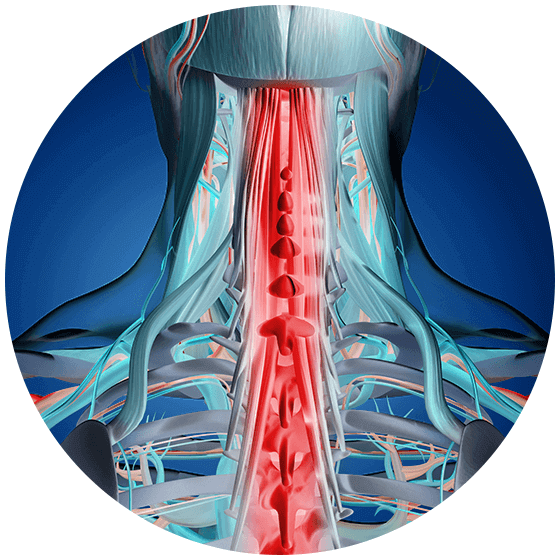Neck Strains & Sprains

Neck Strains & Sprains: Symptoms & Treatment Options
Just as we can suffer a strain or sprain in other parts of our body, the neck is also vulnerable to torn muscle fibers and stretched or torn ligaments. Luckily, neck strains & sprains are generally mild, with symptoms commonly lasting less than a month. Because of the mild nature of most neck strains and sprains, many patients can find relief and restored mobility with noninvasive or nonsurgical treatments.
Many conditions can cause neck strains and sprains. Repetitive stressful movements; sudden movement in any direction, such as whiplash; even something as simple as poor posture are all common sources of neck strains or sprains.
But what exactly is the difference between a muscle strain or sprain? Muscle tissue is fibrous, and any movement that causes a tear in one or more of these fibers is known as a muscle strain. Muscle strains can be painful; however, as is especially true with the small muscles in the neck, symptoms don’t usually persist for longer than a few weeks at most.
A violent or repetitive movement can also injure the tissue that connects our spinal vertebrae. Damage to the ligaments by way of stretching or tearing is called a ligament sprain. In contrast, these injuries are generally more debilitating than muscular strains and require more time to heal.
Other common causes of neck sprains and strains not listed above include: falls, failing to warm up before engaging in physical activity (such as weight lifting), head trauma, or certain sports maneuvers (such as blocking an offensive player).
Common symptoms of neck strains and sprains include:
Neck pain, throbbing, tenderness, or localized swelling
Neck stiffness or limited range of pain-free movement
Jaw pain, ringing in the ears, dizziness, headaches, or nausea
In emergent cases, loss of bowel or bladder control may occur
Neurological symptoms, such as tingling or numbness in the arms, shoulders, or hands
Neck cramps or spasms
Symptoms of Neck Strains & Sprains
Neck sprains and strains can range in severity from barely noticeable to utterly debilitating. Depending upon the severity of the injury, your condition may be accompanied by pinched nerves or cervical radiculopathy. Your symptoms, therefore, will vary depending upon the extent of muscular damage and the specific nerves that are affected.
Worried that your symptoms may indicate a neck strain or sprain? To schedule an appointment with one of our award-winning Top Doctors, contact our team of patient advocates at 973-791-4101.
Diagnosing Your Neck Strains & Sprains
To diagnose your condition, your doctor may assess your reflexes and evaluate you for numbness, weakness, or signs of brain injury. X-rays or CT scans may be used to confirm a diagnosis and eliminate other serious conditions. Sometimes, electromyography (or nerve conduction studies) may be performed to determine if there is a muscle issue. Other diagnostic methods include: measuring the range of motion in your neck; palpating your spine to search for the presence of inflammation or muscle spasms; or neurological examination of your sensory or motor responses.